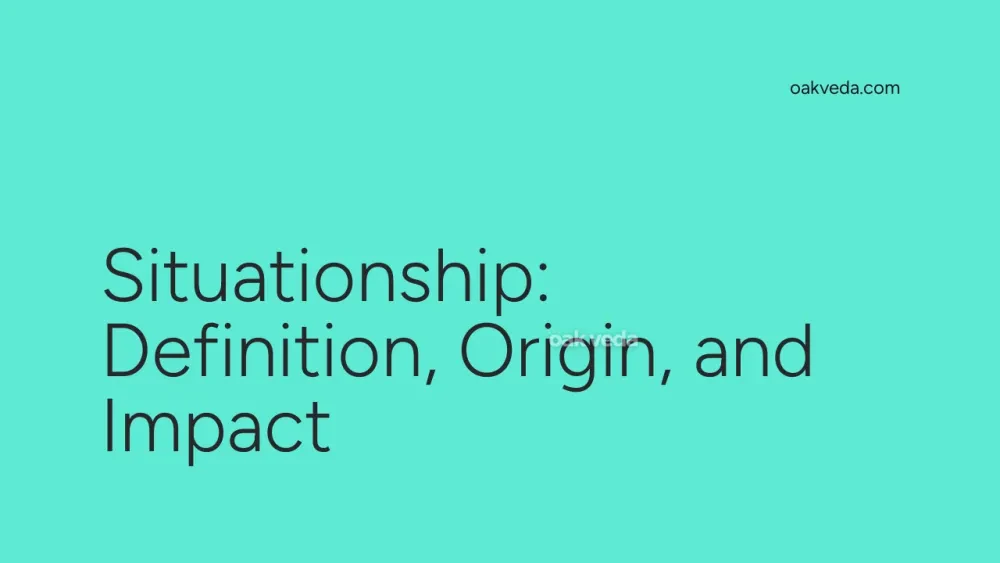
What is a Situationship?
A situationship is a contemporary dating term that describes a romantic or intimate relationship lacking clear definitions or commitments typically associated with traditional partnerships. It occupies a gray area between friendship and a committed relationship, characterized by ambiguity and uncertainty regarding the emotional or romantic status of the connection.
In a situationship, individuals may engage in romantic or sexual activities, spend quality time together, and exhibit behaviors commonly seen in romantic relationships. However, they often avoid explicitly defining the nature of their relationship or establishing clear expectations about exclusivity, long-term commitment, or future plans.
Origin and Development of Situationship
The term "situationship" gained popularity in the mid-2010s, coinciding with the rise of dating apps and the increasing complexity of modern relationships. It emerged as a way to describe the ambiguous romantic connections that became more common in an era of casual dating and hookup culture.
As millennials and Gen Z individuals navigated the changing landscape of relationships, the concept of situationships resonated with many who found themselves in undefined romantic entanglements. The term quickly spread through social media platforms, relationship forums, and popular culture, becoming a widely recognized descriptor for these ambiguous connections.
How Situationships Work
Situationships often develop organically, starting as casual encounters or friendships that gradually evolve into something more intimate. Key characteristics of situationships include:
- Lack of clear labels or definitions
- Inconsistent communication patterns
- Absence of long-term planning or future discussions
- Emotional and physical intimacy without commitment
- Uncertainty about exclusivity
- Reluctance to introduce the partner to friends or family
These relationships can persist for weeks, months, or even years, with both parties enjoying the benefits of companionship and intimacy without the pressures of a formal commitment.
Types of Situationships
While each situationship is unique, some common variations include:
- Friends with Benefits: A primarily physical relationship with an existing friend
- Casual Dating: Regular dates and intimacy without exclusivity or commitment
- Long-Distance Situationship: An ambiguous connection maintained primarily through digital communication
- Rebound Situationship: A casual relationship following a serious breakup
- On-Again, Off-Again: A cyclical pattern of breaking up and reconnecting without fully committing
Popular Examples of Situationships in Media
Situationships have become a popular theme in contemporary media, reflecting their prevalence in modern dating culture:
- The Netflix series "Easy" explores various non-traditional relationships, including situationships
- The song "Situationship" by Snoh Aalegra directly addresses the complexities of these undefined connections
- Many reality dating shows, such as "Love Island" and "Too Hot to Handle," often feature contestants in situationship-like dynamics
Impact of Situationships on Social Media Culture
Situationships have significantly influenced social media culture and online dating behaviors:
- New Vocabulary: Terms like "ghosting," "breadcrumbing," and "cushioning" have emerged to describe behaviors associated with situationships
- Meme Culture: Countless memes and social media posts humorously depict the struggles and experiences of those in situationships
- Dating App Features: Some apps now include options for users to indicate they're looking for something casual or undefined
- Online Support Communities: Forums and social media groups have formed for individuals seeking advice about navigating situationships
Controversies and Debates Surrounding Situationships
The rise of situationships has sparked debates about modern dating culture:
- Emotional Well-being: Critics argue that situationships can lead to anxiety, insecurity, and emotional distress due to their ambiguous nature
- Commitment Phobia: Some view situationships as a symptom of a broader societal trend towards avoiding commitment
- Gender Dynamics: Debates exist about whether situationships disproportionately benefit or harm particular genders
- Relationship Evolution: Discussions continue about whether situationships represent a natural evolution of relationships or a step backward in emotional intimacy
How Brands and Influencers Use the Concept of Situationships
Marketers and influencers have capitalized on the situationship trend:
- Dating Apps: Platforms like Tinder and Bumble create content and features catering to those seeking casual connections
- Relationship Coaches: Many offer advice and courses on navigating situationships
- Product Marketing: Brands use situationship-related humor in ads to appeal to younger audiences
- Content Creation: Influencers share personal stories and advice about situationships to engage followers
Future Trends Related to Situationships
As dating culture continues to evolve, several trends related to situationships are emerging:
- Increased Acceptance: Situationships may become more widely accepted as a valid relationship option
- Technology Integration: Dating apps may develop more sophisticated features to help users navigate undefined relationships
- Mental Health Focus: Greater emphasis on emotional well-being in casual relationships could emerge
- New Relationship Models: Situationships might inspire the development of new, more fluid relationship structures
FAQs about Situationships
-
Are situationships healthy? It depends on the individuals involved and their emotional needs. Clear communication is crucial for a positive experience.
-
How long do situationships typically last? The duration varies greatly, from a few weeks to several years, depending on the individuals and circumstances.
-
Can a situationship turn into a committed relationship? Yes, some situationships evolve into more defined relationships, but this requires open communication and mutual desire for commitment.
-
How do I end a situationship? Be honest about your feelings and intentions, and communicate clearly that you wish to end the arrangement.
-
Are situationships more common among younger generations? While not exclusive to any age group, situationships are more frequently discussed and acknowledged among millennials and Gen Z.
In conclusion, situationships represent a significant shift in modern dating culture, reflecting changing attitudes towards commitment and relationship structures. As they continue to shape social media discourse and influence personal connections, understanding the nuances of situationships becomes increasingly important in navigating the complex landscape of contemporary relationships.
You may be interested in:
- Brand Ambassador: Definition, Origin, and Impact
- Nano-Influencer: Definition, Origin, and Impact
- Menty B: Definition, Origin, and Impact on Social Media
- Unfollow: Definition, Origin, and Impact on Social Media
- Demographics in Social Media: Definition, Origin, and Impact
- B2B in Social Media: Definition, Origin, and Impact

